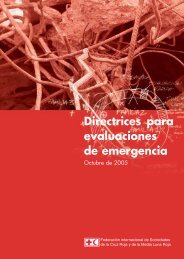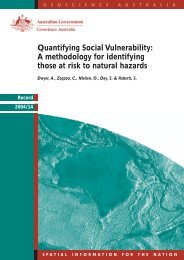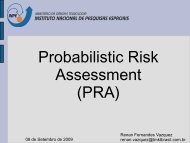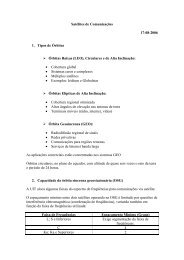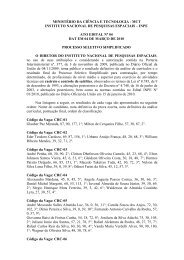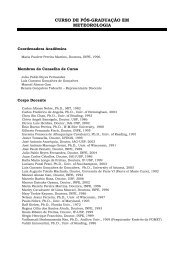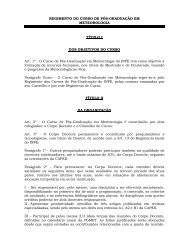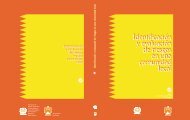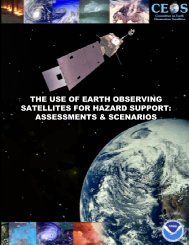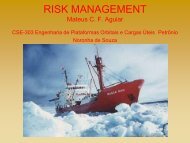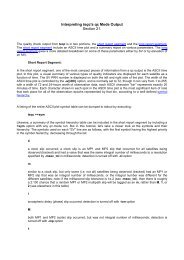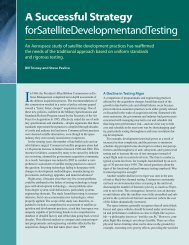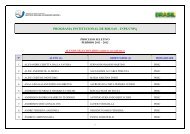Living with Risk. A global review of disaster reduction initiatives
Living with Risk. A global review of disaster reduction initiatives
Living with Risk. A global review of disaster reduction initiatives
Create successful ePaper yourself
Turn your PDF publications into a flip-book with our unique Google optimized e-Paper software.
These joined the long standing Ramsar Convention<br />
on Wetland Preservation (1971) to emphasize<br />
the importance <strong>of</strong> natural resource management<br />
and the dynamic growth <strong>of</strong> risk factors that<br />
contribute to natural <strong>disaster</strong>s.<br />
History <strong>of</strong> the Earth Summit<br />
Related international commitments and the UN role in <strong>disaster</strong> risk <strong>reduction</strong><br />
sustainable development as development which<br />
"meets the needs <strong>of</strong> present generations <strong>with</strong>out<br />
compromising the ability <strong>of</strong> future generations to<br />
meet their own needs."<br />
Sustainable development meets the needs <strong>of</strong> the present<br />
generations <strong>with</strong>out compromising the ability <strong>of</strong> future<br />
ones to meet their own needs….<br />
6<br />
The concept <strong>of</strong> sustainable development dates<br />
back a long way but it was at the UN Conference<br />
on Human Environment (Stockholm, 1972) when<br />
the international community met for the first<br />
time to consider the <strong>global</strong> environment and<br />
highlighted the need to support people in this<br />
process. The Conference indicated that industrialised<br />
environmental problems, such as habitat<br />
degradation, toxicity and acid rain, were not<br />
necessarily relevant issues for all countries and<br />
communities. However, it was the existing<br />
environmental problems that dominated the<br />
meeting and led to wider public environmental<br />
awareness.<br />
In the 1980s, the UN set up the World Commission<br />
on Environment and Development, also<br />
called the Brundtland Commission. They<br />
produced Our Common Future, otherwise<br />
known as the Brundtland Report, which<br />
framed much <strong>of</strong> what would become Agenda<br />
21 and the 27 principles <strong>of</strong> the Rio Declaration<br />
on Environment and Development. It defined<br />
However, the description <strong>of</strong> sustainable development<br />
in Agenda 21 called for a total shift in<br />
the status quo <strong>of</strong> prevalent value systems and<br />
institutional processes. Such <strong>global</strong> change<br />
could never have occurred over night. When<br />
progress was assessed after five years - Rio+5 in<br />
New York, 1997 - many gaps in implementation<br />
were identified, particularly <strong>with</strong> regard to social<br />
equity and poverty. Falling levels <strong>of</strong> <strong>of</strong>ficial<br />
development assistance (ODA) and growing<br />
international debt contributed to this. It also<br />
showed failures to improve technology transfer,<br />
capacity building for participation and development,<br />
institutional coordination, and to reduce<br />
excessive levels <strong>of</strong> production and consumption.<br />
The <strong>review</strong> meeting called for the ratification<br />
and implementation <strong>of</strong> the growing number <strong>of</strong><br />
international agreements and conventions<br />
which refer to environment and development.<br />
The same concerns regarding implementation<br />
have been raised in the Rio+10 preparatory<br />
The four broad areas <strong>of</strong> action <strong>of</strong> Agenda 21<br />
Elements<br />
Social and economic dimensions to<br />
development<br />
Conservation and management <strong>of</strong> natural<br />
resources<br />
Strengthening role <strong>of</strong> major groups<br />
Means <strong>of</strong> implementation<br />
Issues<br />
Poverty, production and consumption, health,<br />
human settlement, integrated decision-making<br />
Atmosphere, oceans and seas, land, forests, mountains,<br />
biological diversity, ecosystems, biotechnology,<br />
freshwater resources, toxic chemicals, hazardous<br />
radioactive and solid waste<br />
Youth, women, indigenous people, NGOs, local<br />
authorities, trade unions, businesses, scientific and<br />
technical communities, farmers<br />
Finance, technology transfer, information, public<br />
awareness, capacity building, education, legal<br />
instruments, institutional frameworks<br />
289



